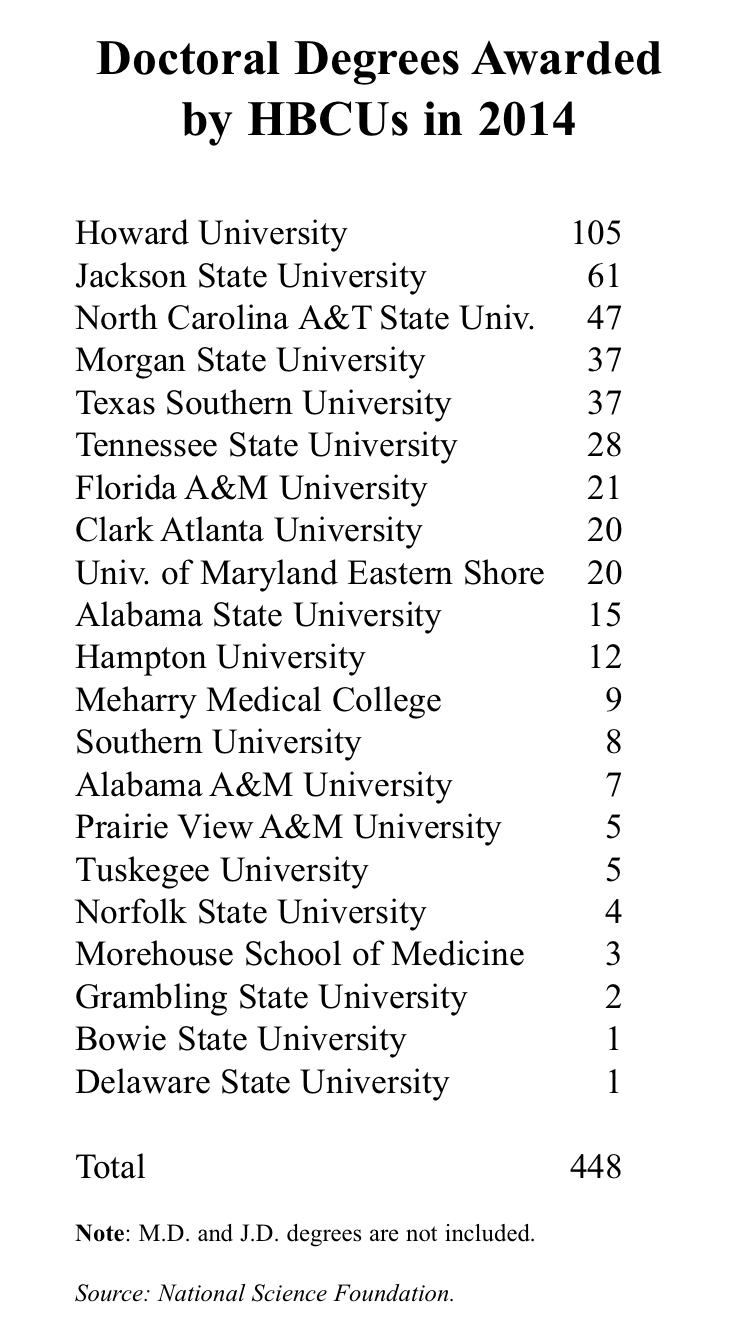 The National Science Foundation recently released its annual report on doctoral degree recipients in the United States. The annual Survey of Earned Doctorates reports that universities in the United States conferred 54,070 doctorates in 2014.
The National Science Foundation recently released its annual report on doctoral degree recipients in the United States. The annual Survey of Earned Doctorates reports that universities in the United States conferred 54,070 doctorates in 2014.
 The report shows that 448 doctorates were awarded by historically Black colleges and universities in 2014. Thus, HBCUs conferred just 0.8 percent of all doctoral degree awarded in the United States in 2014.
The report shows that 448 doctorates were awarded by historically Black colleges and universities in 2014. Thus, HBCUs conferred just 0.8 percent of all doctoral degree awarded in the United States in 2014.
The 448 doctorates awarded by HBCUs is the highest total since JBHE began tracking this statistic. In 2013, HBCUs awarded 396 doctorates. Thus, in 2014 there was a 13 percent increase in HBCU doctoral awards from the previous year.
Howard University in Washington, D.C., led the HBCUs, granting 105 doctoral degrees in 2014. This is the highest number of doctorates ever awarded by Howard in its history, dating back to 1867. Howard University awarded its first Ph.D. degree in 1958. It currently offers 28 Ph.D. degree programs. The university’s previous record number of doctorates awarded was 101, in 2008.
Jackson State University in Mississippi ranked second with 61 doctoral degree awards. This was down from 68 doctoral awards in 2013. In third place among HBCUs, North Carolina A&T State University awarded 47 doctorates in 2014. This is up from 29 doctoral awards in 2013.
Morgan State University in Baltimore and Texas Southern University in Houston each awarded 37 doctoral degrees in 2014. Both universities showed significant increases in doctoral awards from 2013.
Other HBCUs that awarded at least 15 doctorates were Tennessee State University, Florida A&M University, Clark Atlanta University, the University of Maryland Eastern Shore, and Alabama State University.
All told, 21 HBCUs awarded doctoral degrees in 2014. This is up from 20 HBCUs that awarded doctorates in 2013. Bowie State University in Maryland is new to the list this year.
It must be noted that in all probability not all doctoral degrees awarded by HBCUs went to African Americans. But the data does not break down the doctoral degree awards from HBCUs by race or ethnic group.











Congratulations to the doctoral students and especially to the HBCUs for continuing to do the great and significant work of educating African American scholars and for continuing to recognize their genius. My son is currently a doctoral student at an HBCUS and I thank God that he is there everyday working hard to make his dreams a reality. I also that the HBCU that accepted him, Morehouse School of Medicine for providing a climate free of racism so that he can pursue his goals. THIS IS WHY HBCUs, WILL ALWAYS BE RELEVANT AND NEEDED BY THE AFRICAN AMERICAN COMMUNITY.
This report does not show an accurate count. I was one of seven Ph.D graduates at Norfolk State University in 2014. Only four participated in the commencement ceremony, however there were seven overall Ph.D graduates.